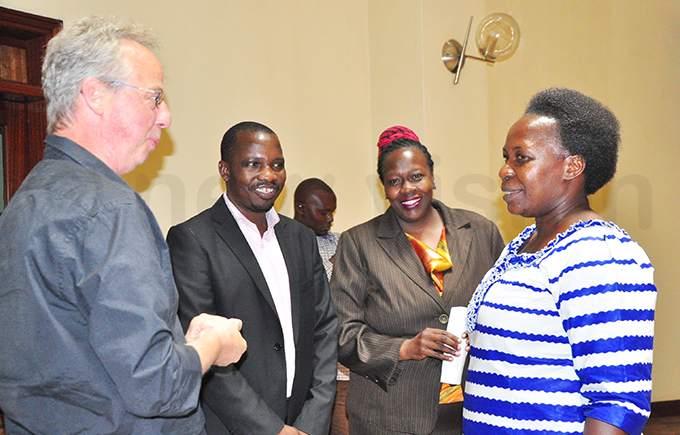Govt calls for increased funding for refugee response
The situation has been worsened by bitter scramble for funds and an imbalance in human resource and skills
Minister Hillary Onek addresses participants during the dialogue on financing local and national actors in Uganda's comprehensive refugee response at Imperial Royale Hotel. Photo by Nancy Nanyonga
Government has called upon international actors to increase funding to national and local actors in the humanitarian sector to enable them improve local response to refugees.
According to the Minister for Relief, Disaster Preparedness and Refugees, Hilary Onek, despite commitments by the international community to promote local actors, the humanitarian space remains skewed in favour of international actors.
"It has been observed that humanitarian space is dominated by international actors with no visible national and local actors, hampering their ability to effectively deliver," Onek said.
The minister made the above remarks at a dialogue on financing of local national actors in Uganda's comprehensive refugee response under the Office of the Prime Minister at Imperial Royale Hotel last week.
The situation, Onek noted, has been worsened by a bitter scramble for funds and an imbalance in human resource and skills.
"Serious competition for funding is a reality to the disadvantage of the national and local actors who do not have strong lobby power and diverse human resources capacities and skills," he said.
 (L-R) Oxfam Uganda's Vincent Koch, Fred Wandera, Sara Kerwegi and local government state minister Jennifer Namuyangu interacting with during the dialogue. Photo by Nancy Nanyonga
(L-R) Oxfam Uganda's Vincent Koch, Fred Wandera, Sara Kerwegi and local government state minister Jennifer Namuyangu interacting with during the dialogue. Photo by Nancy Nanyonga
In light of the imbalances, Onek called upon the international community to align their programming and financing to national and local Non-Governmental Organisations (NGOs) and to honour previous commitments.
"Local actors are the first to respond to the any refugee situation, and thus the urgent need to strengthen their access to international humanitarian funding and funding tools," he added.
The dialogue was attended by representatives from donor governments, the UN and NGO community.
Vincent Koch, the acting country director of Oxfam Uganda, reiterated the need for localisation of the humanitarian sector.
"The current funding picture in Uganda does not reflect this ambition. We know that of the international funding that came into Uganda in 2015, local actors received only 11% through their international partners and this dynamic has not shifted significantly since then," Koch noted.
Citing the Grand Bargain, Onek noted that the international community had pledged to channel 25% of the international emergency funding through national and local responders by 2020, but only 2% of direct humanitarian funding reached local actors in 2016, with 0.4% going to national NGOs.
Lillian Obiale, the program manager Community Empowerment for Rural Development in West Nile, said although they sign numerous contracts, they face challenges of delays in delivering funds.
She also said local NGOs have a challenge of marinating staff as most of them flee to work for international organisations.
In September 2016, Uganda committed to roll out the Comprehensive Refugee Response Framework.
However the refugee response in Uganda is currently underfunded and requires more regional and international support to sustain its progressive policy.